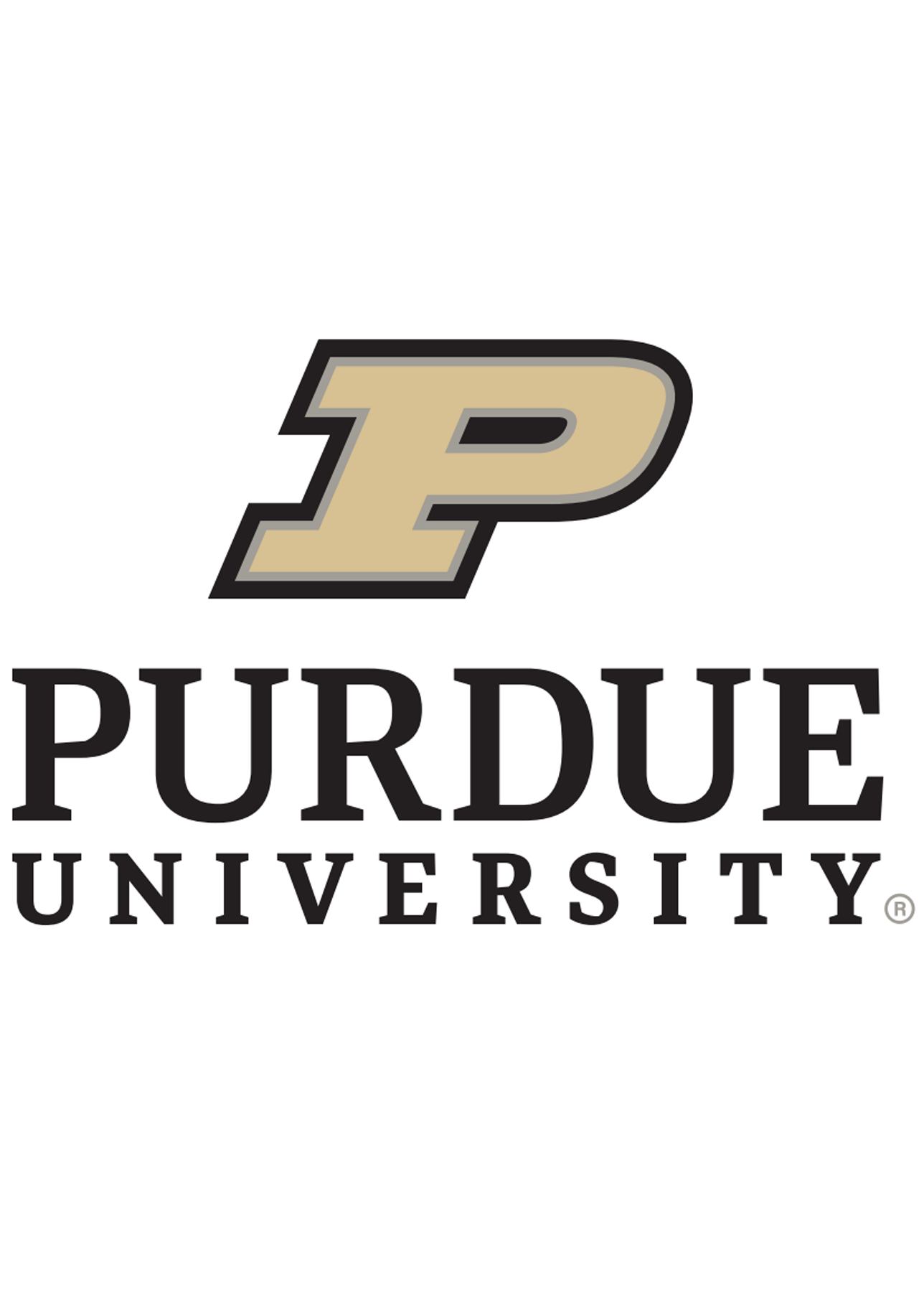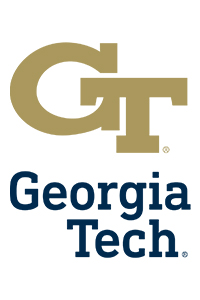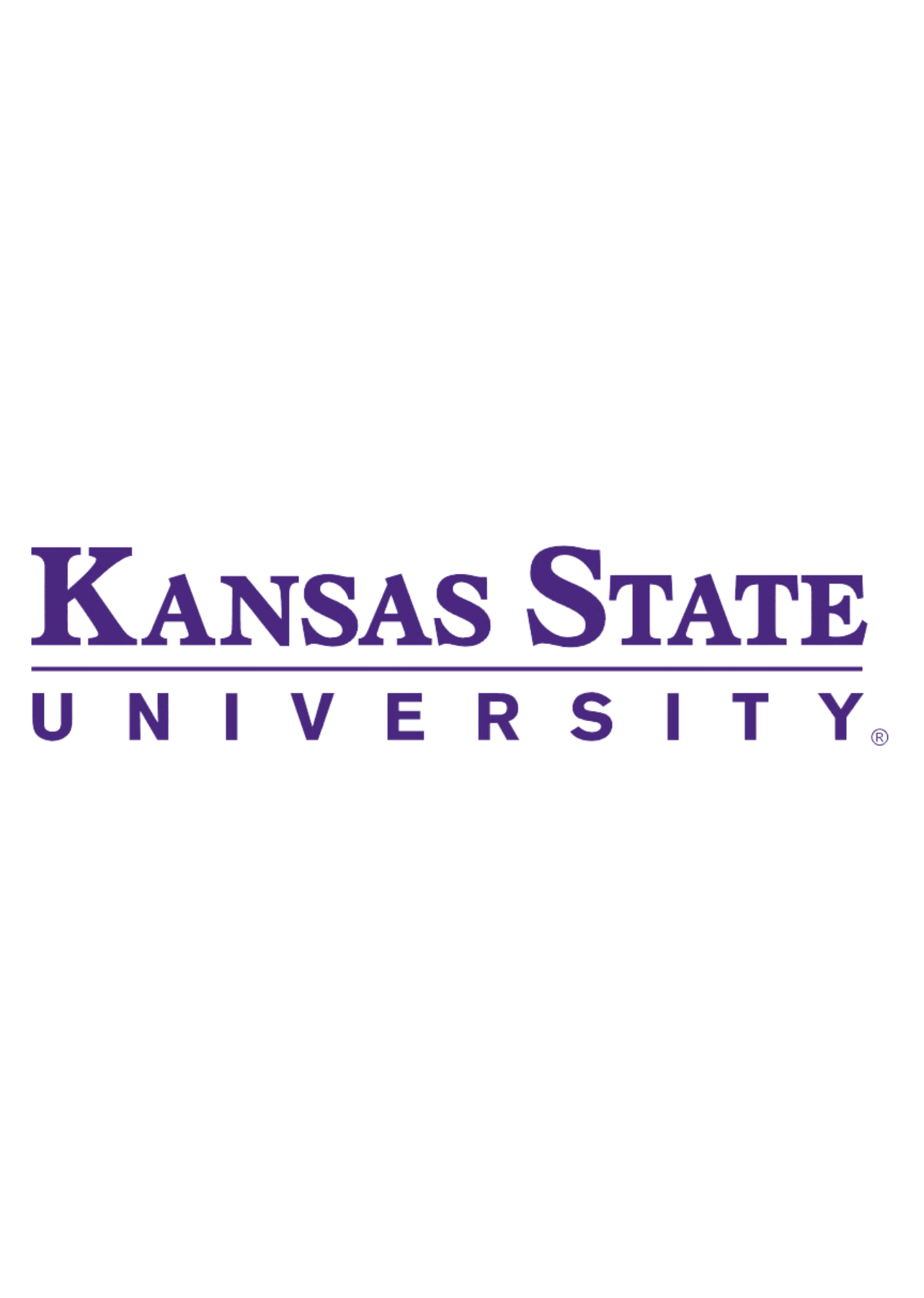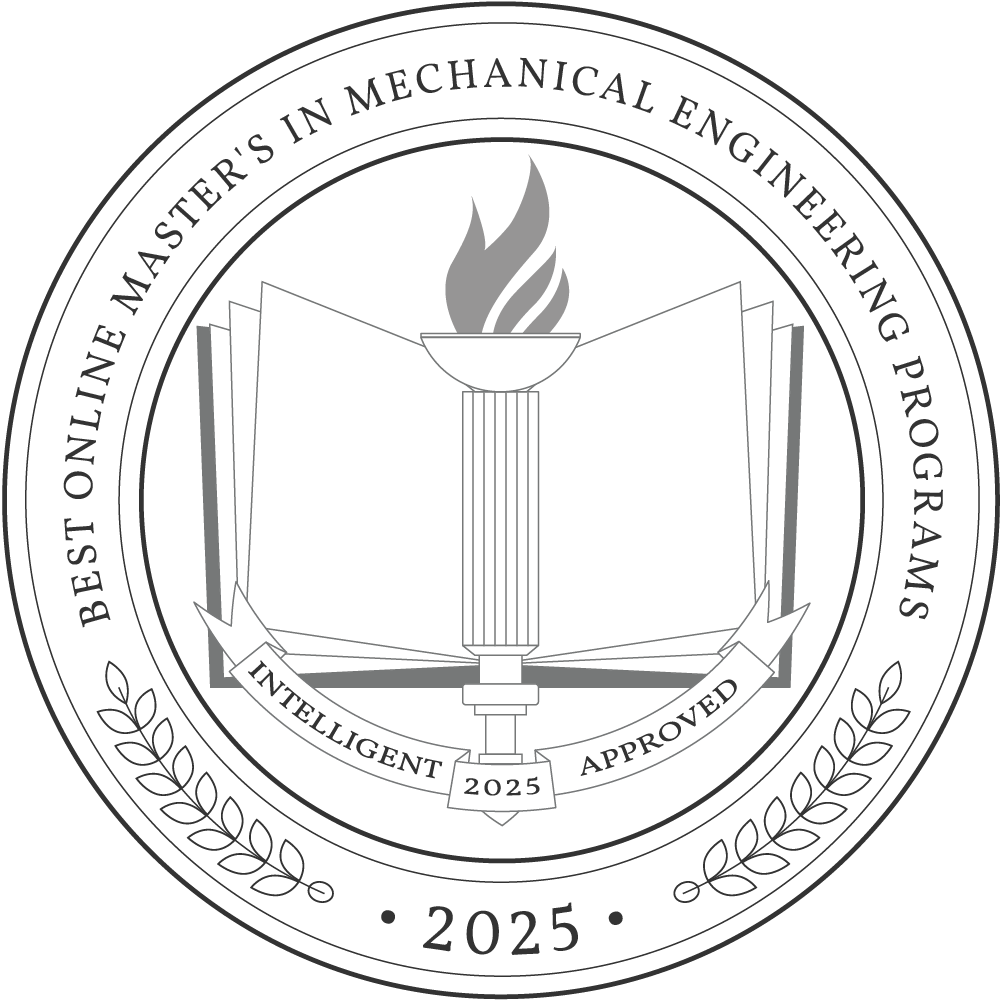A master’s degree in mechanical engineering guides students toward advanced machinery-related positions. According to recent Bureau of Labor Statistics data, mechanical engineers earn an average annual salary of $96,310. While employers do not often require mechanical engineering professionals to possess a graduate degree, a master’s in mechanical engineering advances one’s earning potential and increases qualifications for leadership positions.
Most online programs for a master’s degree in mechanical engineering require 30 credit hours to graduate (or ten classes). Full-time attendees can graduate within two years. The total tuition for these programs ranges from $14,000 to $48,000, depending on whether an institution is private or public.
We interviewed Blanca Villagomez, a program counselor and coordinator at UC-Irvine, to gain her insights on what students should consider when selecting an online master’s degree program.
Why Trust Us
The Intelligent.com Higher Education Team is dedicated to providing students with independent, equitable school and program rankings and well-researched resources. Our expert-driven articles cover topics related to online colleges and programs, paying for school, and career outlooks. We use data from the U.S. Department of Education’s College Scorecard, the National Center for Education Statistics, and other reputable educational and professional organizations. Our academic advisory team reviews content and verifies accuracy throughout the year for the most current information. Partnerships do not influence rankings or editorial decisions.
- Analyzed over 2,000 national, accredited, and nonprofit colleges and universities
- 800+ rankings pages are reviewed and updated yearly
- Content is informed by reputable sources, surveys, and interviews with academic advisors and other experts
- Over 100 data points are reviewed for accuracy and quality throughout the year, including sources
How we rank schools
Our list features the best online Mechanical Engineering degree programs at top colleges nationwide. Each school featured is a nonprofit, accredited institution — either public or private — with a high standard of academic quality for post-secondary institutions.
We evaluated each school’s program on tuition costs, admission, retention and graduation rates, faculty, reputation, and the student resources provided for online students. We collected data from trusted sources like the National Center for Education Statistics, individual school and program websites, school admissions counselors, and other data sources. Then, we calculated the Intelligent Score on a scale of 0 to 100 based on the following criterion:
Academic Quality:
- Admission rate versus enrollment rate
- Retention rate of students who return after year one
- Accreditation status (regional and programmatic)
- Nonprofit status, both private and public institutions
Graduation Rate
- Overall graduation rate
- Total number of currently enrolled students, including diversity metrics
- Student-to-faculty ratio
Cost and ROI
- In-state and out-of-state per-credit tuition rates and fees
- Required credits to graduate
- Earning potential after graduation
- Availability of federal student loans, scholarships, and other financial aid options
Student Resources
- Available student services for online-only and hybrid programs
- On-campus amenities like tutoring centers and the number of libraries
Read more about our ranking methodology.
Best 46 Accredited Online Master's in Mechanical Engineering Programs
FiltersInstitution Type
Status
- Intelligent Score
- Alphabetically By University Name
- Acceptance Rate
- Enrollment
- In-state Graduate Tuition
- Out-of-state Graduate Tuition
- In-state Undergraduate Tuition
- Out-of-state Undergraduate Tuition

Purdue University
Intelligent Score: 99.83In-state: $9,208
Out-of-state: $28,010
In-state: $9,208
Out-of-state: $9,208
SAT: 1170-1420
ACT: 25-33
$833
Online, On-Campus
Higher Learning Commission
30

Stanford University
Intelligent Score: 99.55In-state: $55,473
Out-of-state: $55,473
In-state: $54,315
Out-of-state: $54,315
SAT: 1420-1570
ACT: 31-35
$1,456
Online
Western Association of Schools and Colleges Senior College and University Commission
30

Georgia Tech
Intelligent Score: 99.55In-state: $28,106
Out-of-state: $49,218
In-state: $27,898
Out-of-state: $27,898
SAT: 1370-1530
ACT: 31-35
$1,119
Online
Southern Association of Colleges and Schools Commission on Colleges
30

University of Illinois at Urbana - Champaign
Intelligent Score: 98.93In-state: $14,317
Out-of-state: $33,824
In-state: $15,016
Out-of-state: $15,016
SAT: 1200-1460
ACT: 27-33
$1,160
Online
Higher Learning Commission
32

North Carolina State University
Intelligent Score: 98.56In-state: $6,535
Out-of-state: $26,654
In-state: $9,095
Out-of-state: $9,095
SAT: 1230-1410
ACT: 27-32
Resident: $547
Non-Resident: $1,701
Online
Southern Association of Colleges and Schools Commission on Colleges
30

University of Southern California
Intelligent Score: 98.21In-state: $59,260
Out-of-state: $59,260
In-state: $47,880
Out-of-state: $47,880
SAT: 1340-1530
ACT: 30-34
$2,424
Online, On-Campus
Western Association of Schools and Colleges Senior College and University Commission
27-30

Johns Hopkins University
Intelligent Score: 97.65In-state: $54,160
Out-of-state: $54,160
In-state: $57,010
Out-of-state: $57,010
SAT: 1470-1560
ACT: 34-36
$1,757
Online, Hybrid
Middle States Commission on Higher Education
30

University of Florida
Intelligent Score: 97.06In-state: $4,477
Out-of-state: $25,694
In-state: $10,770
Out-of-state: $10,770
SAT: 1290-1460
ACT: 29-33
Resident: $449
Non-Resident: $690
Online, On-Campus
Southern Association of Colleges and Schools Commission on Colleges
30

Auburn University
Intelligent Score: 97.00In-state: $10,080
Out-of-state: $30,240
In-state: $10,080
Out-of-state: $10,080
SAT: 1160-1320
ACT: 25-31
$949
Online, On-Campus
Southern Association of Colleges and Schools Commission on Colleges
30

Missouri University of Science and Technology
Intelligent Score: 96.87In-state: $9,330
Out-of-state: $28,563
In-state: $10,452
Out-of-state: $10,452
SAT: 1238-1390
ACT: 26-31
$950
Online
Higher Learning Commission
30

University of California, Los Angeles
Intelligent Score: 96.34In-state: $11,442
Out-of-state: $41,196
In-state: $11,442
Out-of-state: $11,442
SAT: 1310-1530
ACT: 30-35
$1,100
Online
Western Association of Schools and Colleges Senior College and University Commission
36

PennState World Campus
Intelligent Score: 95.84In-state: $15,025
Out-of-state: $24,413
In-state: $22,464
Out-of-state: $22,464
SAT: 1070-1300
ACT: 24-29
$1,132
Online
Middle States Commission on Higher Education
32

Michigan Technological University
Intelligent Score: 95.32In-state: $17,339
Out-of-state: $38,082
In-state: $21,744
Out-of-state: $21,744
SAT: 1160-1350
ACT: 25-30
$1,516
Online
Higher Learning Commission
30

Kansas State University
Intelligent Score: 95.29In-state: $9,375
Out-of-state: $25,251
In-state: $10,212
Out-of-state: $10,212
SAT: N/A
ACT: N/A
$536
Online
Higher Learning Commission
30

University of Michigan - Dearborn
Intelligent Score: 93.91In-state: $16,520
Out-of-state: $53,669
In-state: $24,344
Out-of-state: $24,344
SAT: 1340-1520
ACT: 31-34
Resident: $531
Non-Resident: $663
Online, On-Campus, Hybrid
Higher Learning Commission
30

University of Delaware
Intelligent Score: 93.77In-state: $12,730
Out-of-state: $34,160
In-state: $34,164
Out-of-state: $34,164
SAT: 1150-1330
ACT: 25-30
$1,069
Online, Hybrid
Middle States Commission on Higher Education
30

Texas A&M University College of Engineering
Intelligent Score: 91.20In-state: $8,395
Out-of-state: $36,849
In-state: $6,775
Out-of-state: $6,775
SAT: 1160-1380
ACT: 26-32
Resident: $718
Non-Resident: $1,249
Online, On-Campus
Southern Association of Colleges and Schools Commission on Colleges
30

Colorado State University
Intelligent Score: 91.20In-state: $9,426
Out-of-state: $28,147
In-state: $10,520
Out-of-state: $10,520
SAT: 1070-1280
ACT: 23-29
$964
Online
Higher Learning Commission
30
How to Choose an Online Master’s in Mechanical Engineering Program
Choose your area of study
Master’s degrees in mechanical engineering are typically offered as a Master of Engineering (MEng) in mechanical engineering. However, some schools provide a Master of Science (MS) in mechanical engineering. While the programs share similar topics, the former emphasizes more practical industry applications while the latter is more research-focused.
Also, many programs allow you to select a concentration and focus your studies on a particular niche in this field, such as manufacturing, robotics, or thermofluids. If you already know what you would like to do after you graduate, look for programs that closely match these specific career goals.
“Gaining clarity on your strengths and interests can help you find a graduate program and career track that are a good fit,” says Villagomez. “Begin by reflecting on your strengths, including areas of expertise, skills, and fields of knowledge. List all your career interests and outline the types of work that spark your joy and excitement — gaining clarity on your strengths and interests can help you find a graduate program and career track that are a good fit.”
Research schools and programs
You should only apply to institutions that have been approved by a DOE-recognized regional accrediting organization, such as the New England Commission of Higher Education or Northwest Commission on Colleges and Universities. These organizations evaluate schools to ensure they provide students with a high-quality education. Those who attend a school that isn’t regionally accredited may be unable to access financial aid or transfer credits to another institution if needed.
You should also look for programmatic accreditation from the Accreditation Board for Engineering and Technology (ABET), as this is essential for professional engineering licensure.
Beyond accreditation, online students should seek answers to the following questions:
- Will you have access to tutoring, mental health services, career counseling, library resources, technical support, and other student-related services?
- How is practical application facilitated? Do students participate in an internship?
- Does the program require a thesis to graduate?
To learn more about any schools that you’re interested in, you can visit the school’s website, contact an admissions counselor, follow the school on social media, or attend an in-person or virtual open house.
Prepare for tests and applications
Application requirements vary by school and program. Online master’s in mechanical engineering programs usually require interested students to have a bachelor’s degree in a related field and a minimum GPA of 3.0, so you’ll need to send transcripts. Most programs also request GRE (Graduate Record Examination) scores; if you struggle with standardized testing, you may opt to enroll in a class to help you prepare.
In addition, prospective students should ask current college professors or professional supervisors for letters of recommendation. Most applications also mandate a personal statement and resume. Check your school’s submission deadlines and prepare your materials accordingly. Before submitting an application, always contact an admissions counselor to ensure you have the most accurate information regarding requirements and deadlines.
“Highly selective schools often require well-crafted essays, standardized exams, recommendation letters, and even interviews,” says Villagomez. “With all these requirements, students must stay organized with a comprehensive and detailed checklist to track their progress, submit all required materials, and meet deadlines. I encourage students to decide what systems help them organize the application requirements and track their progress for each school.”
Select your program
Once you’ve researched each program and narrowed down those that meet your academic and professional goals, consider the following factors as well:
- Cost
- Availability of scholarships
- Competitiveness
- Investment in building an online community
- Faculty-to-student ratio
- Professional development opportunities
Also, consider which programs you’ve most enjoyed researching or for which you had the most positive experience speaking with admissions staff. You should choose a degree that makes you feel welcome and excited.
Before making your final decision, review your needs and goals again. Do you plan to attend school full-time or part-time? Are you only interested in 100% online programs, or are you fine with a hybrid program that has a few in-person requirements? Some programs offer asynchronous courses, which can be completed at your own pace, while others only offer synchronous courses, which involve remotely attending lectures and completing assignments at the same time as other students — which of these two online learning formats do you prefer? Your school should accommodate your scheduling needs and learning preferences.
Determine how you’ll pay for your degree
Meet with your program’s financial aid office to discuss strategies for paying tuition. The people there may be able to direct you toward school-affiliated or private scholarships for which you qualify. You should also complete the FAFSA (Free Application for Federal Student Aid) to ascertain your federal loans and grants eligibility.
“Be sure to complete and submit the FAFSA application and any others, such as your state’s Dream Act application, well ahead of deadlines to ensure your information is reviewed promptly,” Villagomez advises. “Depending on your family’s income, your income, and other financial factors, you may receive a generous financial aid package or have to rely more on loans and out-of-pocket contributions.”
Working engineers should speak with their employers about their graduate school aspirations. Employers can direct them toward employee tuition benefits if offered.
What Can You Expect from an Online Master’s in Mechanical Engineering Program?
Mechanical engineers work across various industries, including aerospace, construction, defense, and electronics. Master’s students build on the principles learned during their undergraduate study, then further specialize in their chosen field. Attendees develop the leadership and big-picture skills that advanced positions in engineering demand.
On average, an online master’s in mechanical engineering requires 30 credit hours, including core coursework, electives, and a thesis or similar capstone project. Full-time students can graduate within two years, while part-time students may need three years or more.
Potential courses you’ll take in an online master’s in mechanical engineering program
- Thermodynamics of Materials. This course focuses on thermodynamics fundamentals. Students develop an advanced understanding of entropy, enthalpy, and free energy principles.
- Properties and Processing of Electronic Materials. Students focus on the electronic principles and processes behind materials’ processing, structure, and property relationships. Coursework emphasizes metals and alloys, insulators, and semiconductors.
- Environmental Issues in Manufacturing and Product Use. Participants discuss environmental, regulatory, and economic factors related to a product’s lifecycle. Students learn through specific case studies about metals, ceramics, paper, and polymers.
- Mechanical Behavior and Strengthening Mechanisms. This course covers dislocation theory with particular emphasis on crystalline defects, movement of dislocations, and dislocation arrays and crystal boundaries.
What Can You Do With an Online Master’s in Mechanical Engineering?
Career outlook
Mechanical engineers play a vital role in designing and developing new technologies, improving existing systems, and contributing to advancements that impact society at large. The integration of new materials, automation, and renewable energy sources also creates opportunities for mechanical engineers to lead in sustainable and environmentally conscious initiatives.
Earning an online master’s degree in mechanical engineering opens doors to a spectrum of rewarding career paths. Here are some potential options to consider:
- Mechanical engineer — Design new mechanical and thermal devices, oversee the manufacturing process of such devices, and investigate equipment failures.
- Median annual salary: $96,310
- Projected employment growth (through 2032): 10%
- New job openings projected: 19,200 annually
- Aerospace engineer — Develop and test aircraft, spacecraft, satellites, and missiles.
- Median annual salary: $126,880
- Projected employment growth (through 2032): 6%
- New job openings projected: 3,800 annually
- Environmental engineer — Develop and test technology for dealing with environmental issues, such as pollution and global warming.
- Median annual salary: $96,530
- Projected employment growth (through 2032): 6%
- New job openings projected: 3,400 annually
Online Master’s Degree in Mechanical Engineering Frequently Asked Questions
How do I apply to an online program for a master's degree in mechanical engineering?
First, review the application materials requested through the program’s website. Then, contact an admissions counselor with any questions regarding the application process and deadlines. Some mechanical engineering programs operate on a rolling basis, but many adhere to strict start dates and limited cohort sizes. Prepare your application packet well before submission deadlines. Some of the more common application materials for an online mechanical engineering master’s degree include:
- A statement of intent
- Official copies of undergraduate transcripts
- A resume
- Letters of recommendation
- GRE test scores
- An application fee
- A completed graduate school application form
How much does an online master's degree in mechanical engineering cost?
According to the National Center for Education Statistics, the average cost of graduate school tuition is $20,513 per year. Private schools are usually more expensive than public schools, and most public schools charge out-of-state students a higher tuition rate than in-state students.
Besides tuition, indirect program costs include books, software, online course technology fees, and remote learning expenses (including computer equipment and reliable internet service).
How long does it take to earn a master's degree in mechanical engineering online?
Most online master’s in mechanical engineering degrees require 30 credits (roughly ten classes). As such, full-time attendees can feasibly graduate in less than two years. However, many engineering professionals continue to work alongside their studies, so they may instead opt to attend part-time. If pursuing coursework part-time, at just one or two classes each semester, students may graduate in three years. Most programs do require students to graduate within five years.
Is an online master's in mechanical engineering worth it?
Pursuing an online master’s degree in mechanical engineering offers numerous advantages and the potential for a fulfilling career. This advanced degree equips you with specialized knowledge, technical expertise, and problem-solving skills that are highly sought after in various industries.
One of the key benefits of earning a master’s in mechanical engineering is the potential for increased earnings. Graduates with this degree often qualify for higher-paying positions and leadership roles.
An online master’s in mechanical engineering prepares you to contribute to innovative projects and technological advancements. With expertise in areas such as product design, energy systems, and automation, you can drive sustainable solutions, improve manufacturing processes, and shape the future of engineering.
Online master’s programs in mechanical engineering provide flexibility, allowing you to balance your studies with work or personal commitments. Virtual learning platforms offer access to cutting-edge tools, software, and simulations, enabling you to enhance your skills and knowledge from anywhere.


